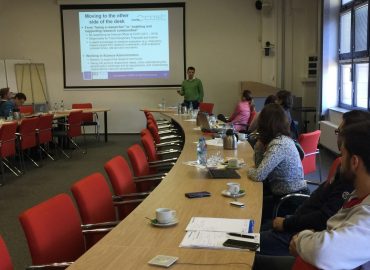Connected and Autonomous Driving (CAD) is nowadays a thoroughly discussed topic both in consumer media as well as in the scientific and academic community. To raise awareness and promote cross-faculty collaboration at the University of Žilina on this emerging area, the ERAdiate team organised a dedicated Lecture Series on CAD in October 2018. On this occasion, two international experts were invited to present the socio-economic and technical aspects of the forthcoming transition to CAD in Europe.
The first presentation was held by Maria Alonso Raposo, Scientific/Technical Officer at the Sustainable Transport Unit of the European Commission´s Joint Research Centre in Ispra, Italy. Maria´s presentation focused on the analyses of expected future social and economic impacts of cooperative and autonomous mobility in Europe. The results of the research suggest that while deployment of cooperative and autonomous vehicles will have a positive impact on various sectors (mainly automotive, electrotechnical and software industries, freight transport and telecommunications), other sectors such as insurance or vehicle repair and maintenance services will face serious challenges. Important labour changes lie ahead of professional drivers, decreasing driving tasks towards the acquisition of new and more technical roles, using mainly ICT skills for their job. The Joint Research Centre analysis concludes, that very likely, several job positions will entirely disappear. Those interested in further details can check the full report by the EC JRC, which is publicly available.
The second presenter of the event was François Fischer, Senior Manager for Innovation and Development at ERTICO ITS and coordinator of H2020 project AUTOPILOT. His presentation focused on IoT and new-generation communication networks as enabling technologies for effective communication and big-data processing for Cooperative and Autonomous Mobility. François focused on the technological challenges to be solved to achieve fully autonomous transport systems and then presented the AUTOPILOT project approach to address such challenges. More details about the AUTOPILOT project can be found on the AUTOPILOT project website.
Following discussion on the state-of-the-art in CAD brought interesting conclusions, namely that even the technology in the field evolves rapidly, there is still a tremendous amount of work that has to be done along our way towards truly intelligent, reliable and inclusive autonomous vehicles mainly in the fields of machine learning, big-data processing and communication technologies.




